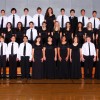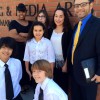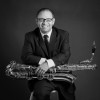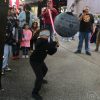InterView By Chris Murphy
School is not just reading, writing and arithmetic. School is about learning and becoming an exceptional human being. One of the ways you can enhance your education is to learn to play an instrument. My mom was a teacher here in Modesto and I learned how to play piano early. She believed in music and education. I started to play trumpet in 4th grade and that lead to guitar and so much more. Music changed my life, it made learning more fun and it increased academic performance.
This is a fact. Arts in school, such as learning to play music increase test scores, increase the ability to learn and create well rounded and interesting people. We are lucky that we still have music in our local schools and our community needs to show support, both financially and in attending and supporting the events that student musicians present. People in Modesto love MoBand, and MoBand is mostly made up of people that play or played music in school. It connects us all and this month we will meet one of our dynamic music teachers, Ulices Chavez. Ulices is Music Director for Bands and Orchestra at LaLoma Junior High. Ulices went to to Modesto High School and received his degree at CSU Stansilaus and brings excitement to the music programs of Modesto City Schools. Let’s meet Ulices Chavez
ModestoView: What was it that inspired you to first learn to play an instrument?
Ulices Chavez: In the 5th grade my next door neighbor and the coolest kid in school, Joey Reyes, took up saxophone. I figured if I play saxophone also, Joey and I could walk home together carrying our saxophones and then I would also be cool by association. One month into saxophone lessons Joey quit, but I liked it, and as they say, the rest is history.
MV: Who were your musical inspirations?
UC: My musical inspirations tend to come in two forms, performance and educational. PERFORMANCE wise, my influences range from classical saxophonists Eugene Rousseau & Donald Sinta to Pablo Casals on cello. On the jazz side there was of course Bird (Charlie Parker), John Coltrane & Johnny Hodges. EDUCATIONALLY speaking, it all really started with my HS band director at Modesto HS, Gary Runsten. I had a great time in my HS band but it was in college where I started learning, and am still learning, the true meaning of music. Dr. Ed Harris at CSU Stanislaus instilled in me the ethics needed to be good a musician. Whether you go into performance, teaching or conducting the one common component of all successful people in the field of music is that they are good musicians. And my final bit of inspiration comes from my colleagues. Whether I’m at a conference, music festival, concert or a social gathering, we listen to each others groups, we talk to each other, we share new ideas or new pieces of music our groups thoroughly enjoyed….we all learn and are inspired from each others successes.
MV: Where there times when you wanted to give up and thought it wasn’t right for you?
UC: Yes. I have always said that if I ever become one of those teachers that are in “it for the check”, then I need to do something else. We all know a few of them, those teachers that arrive 5 minutes before the bell rings and then leave right after school. I was feeling that way when I taught HS, but it wasn’t because I didn’t want to teach, I just needed a change. So I stepped down from my HS position so that someone with spunk could come in and take over. I have been teaching junior high school for the past 11 years and love it!
How important do you believe it is to have music in the schools? All you have to do is read all of my other answers and that should give you a pretty good idea how important I think music is in our schools
MV: Do you believe that academic test scores are improved by the skill of playing music?
UC: Yes, absolutely! According to study after study for the past decade or two, academic success is higher among students who take music. Music can stimulate the efficiency of cognitive functions in the brain. Playing music depicting a county landscape or improvising a jazz solo requires the creative process (right side of the brain) but in order to achieve that there are a basic set of fundamental technical aspects, such as chordal structure, time & fingerings to name a few, that must be addressed (left side of brain). All of these practices can and do crossover into other areas of academia.
MV: You have a deep curriculum connecting students with the history of Rock and Roll, how does this help you with the instruction of playing music and performing?
UC: I can’t recall who said this, but I remember hearing a quote that says, “The Blues had a baby and it’s called Rock n Roll”. The first true American form of music was jazz/blues, so in my Band & Orchestra classes I usually use Rock n Roll in historical contexts. If one of my concert bands was playing Ronald LoPresti’s “Elegy for A Young American” (composed the year after John F. Kennedy’s assassination) I might also play for them some early Motown or British Invasion music so the students could put the Elegy into historical context with the modern music of that day (early/mid 60’s).
MV: What do you hope you accomplish with each year of music instruction?
UC: I hope the students can take away just a little something new from my music classes each day. There is a much bigger picture that I address with them at the end of the school year but it all builds one day at a time. Basically an appreciation of music and its nuances and how it can relate to everyday life situations whether it be daily interactions, emotional bonds with loved ones or even the playful gestures that make us smile everyday. Everything really is interrelated.
MV: Do you have any favorite memories or events in performance or previous students?
UC: For me, I would have to say my second year of teaching. I had an average level group, they weren’t the best they weren’t the worst I’ve ever had but I would be hard pressed to find another group that had the music GROWTH that crop of students had. It was like lecturing to a sponge…whatever I said they just soaked it in! It was a fantastic group of kids. As a matter of fact I’m facebook friends with over half of the 52 members of that band! (see attached pic!)
MV: What would you ask from our community in support of music in the schools?
UC: You want your kids to stay out of trouble, get them in band or orchestra. You want them to get better grades, get them in band or orchestra. Our children are the products of their environment, you surround your child with other respectful, happy, responsible children and it will rub off on them, GET THEM IN BAND OR ORCHESTRA!! Now, from a fiscal point of view, this has not been the traditional mindset of most school districts. District personnel & school boards are all about THE NUMBERS, which is understandable, they want results. However, a fact of life is that music is inherently expensive and in order for school districts to support music at a higher than rudimentary level (we have some music teachers at FOUR different schools!) we need parents and supporters of music to talk to principals, district personnel, attend school board meeting and insist that music in our schools are fully implemented. Every 3-5 years a new “learning” concept or some latest greatest way to educate our children is introduced. Scientific data showing the positive effect music has on academics has been around for a couple of decades now. My question is, why haven’t we fully embraced this?
MV: Our traditional question, Beatles or Stones?
UC: I’ve been teaching Hist. of Rock for over 15 years and I still have a hard time answering that question. So here is my cop-out answer…..for groove, I’m going to go with the Stones, for ingenuity I will say the late stage Beatles. My favorite rock band of all time is Dave Matthews Band.
PICTURES 1) Juan Crespi Jr. High Band (2nd year teaching) 2) Professional studio pic (Kathy Ray Photography) 3) 2014 La Loma Jr. High Honor Orchestra students 4) 2013-14 La Loma Jr. High Band 5) Conducting the Ernie Bucio Little Big Band with guest soloists Bill Watrous (trombone) and Mike Vax (trumpet)













